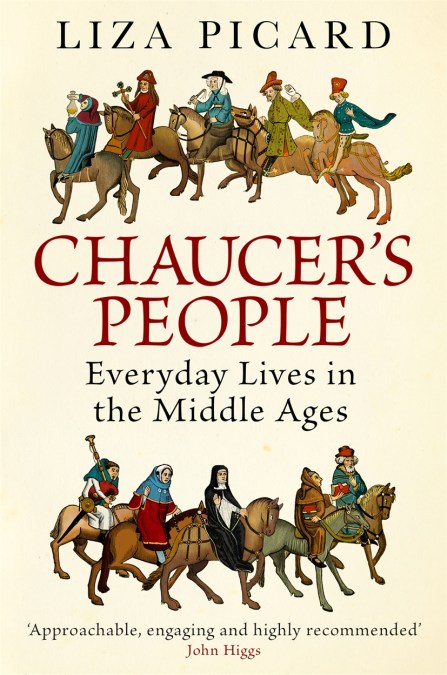Chaucer’s People
On sale
18th October 2018
Price: £12.99
‘A holiday in the complex, joyful, indelicate medieval world’
John Higgs, author of Watling Street
Chaucer’s People is an absorbing and revealing guide to the Middle Ages, populated with Chaucer’s pilgrims from The Canterbury Tales. These are lives spent at the pedal of a loom, maintaining the ledgers of an estate or navigating the high seas. Drawing on contemporary experiences of a vast range of subjects including trade, religion, toe-curling remedies and hair-raising recipes, bestselling historian Liza Picard recreates the medieval world in glorious detail.
John Higgs, author of Watling Street
Chaucer’s People is an absorbing and revealing guide to the Middle Ages, populated with Chaucer’s pilgrims from The Canterbury Tales. These are lives spent at the pedal of a loom, maintaining the ledgers of an estate or navigating the high seas. Drawing on contemporary experiences of a vast range of subjects including trade, religion, toe-curling remedies and hair-raising recipes, bestselling historian Liza Picard recreates the medieval world in glorious detail.
Newsletter Signup
By clicking ‘Sign Up,’ I acknowledge that I have read and agree to Hachette Book Group’s Privacy Policy and Terms of Use
Reviews
Chaucer's pilgrims are the first historical characters who feel like real people, and now Liza Picard makes their world as vivid and three-dimensional as the merry band themselves. Chaucer's People is a holiday in the complex, joyful, indelicate medieval world - an approachable, engaging and highly recommended account of an England which is long gone, but whose spirit lingers
Instructive fun ... The writing is always lively, and there are excellent colour illustrations
Liza Picard, a chronicler of London society across the centuries, now weaves an infinity of small details into an arresting tapestry of life in 14th-century England. Her technique - pursued with the verve and spirit for which she is already justly admired - is to celebrate Chaucer's pilgrim portraits by resituating them within an enlarged field of medieval practices and assumptions ... Picard concludes with a speculative Chaucer continuation ... Most notably, she - a woman who has herself lived long and thought much - creates an inner monologue for the Wife of Bath, who, after visiting the shrine, drifts into a Molly Bloomian soliloquy, reflecting on the pros, cons, and possible personal advantages of taking the veil. As in the rest of the book, we here encounter not presumption but homage, an enthusiast enacting her respect for Chaucer's enduring and indelible accomplishment
An absorbing and revealing companion volume to The Canterbury Tales
As you read this book, Chaucer's writing gains a depth and pungency it usually lacks ... Sometimes these snippets, in their oddness, distance the toiling pilgrims from us. At others, they bring them much closer ... There is a Chaucerian pleasure in plain sentences, plainly written. This is more almanac than argument, but no less enjoyable for that. If you were to reread The Canterbury Tales, you'd get so much more from it with this at your side ... And there are some excellent titbits
Engaging and fun ... The premise of this entertaining book is to provide historical context for the multitude of figures in Geoffrey Chaucer's Canterbury Tales. It is well researched and packed with intriguing nuggets - from the etymology of the word "haberdasher" (from an old Icelandic word meaning a pedlar's sack), to the story of Richard Steris, "one of the cunningest players at the tenys in England", and a wonderful selection of medieval recipes ... Picard provides a wealth of detail both about the occupations of the various characters, and the wider contexts in which they operated. The section on the overwhelmingly complex nature of medieval law is particularly clear and effective
Chaucer's fourteenth-century story collection The Canterbury Tales is a classic hook on which to hang an exploration of the Middle Ages, and this take pleasingly spirals outwards to cover the characters (the nun, the knight, the miller) and the lives they would have led
Wonderfully readable and full of delights ... It buoyed me up with its brilliant insights, many of them entirely new to me
Brings to life the social history of a period we still know little about. A jolly good read for historians

